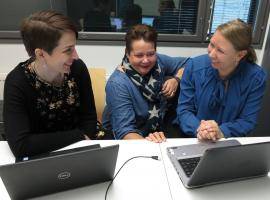Municipalities as drivers of change in the regeneration of urban labour markets – The paradigm of the GSIP Project “Updating skills for employees” model

INTRODUCTION
As discussed in the Journal No.1 of the GSIP (Growth and Social Investments Pacts) Project (https://www.uia-initiative.eu/en/news/gsip-expert-journal-1-get-know-project-and-what-happened-first-6-months), the GSIP Project reflects the City of Vantaa key policy decision: i. to promote growth and competitiveness of local companies; and ii. to improve level of education of workforce and offer better training possibilities for low-skilled employees, employees with outdated skills and unemployed persons, through the design and implementation of a new, innovative and exceptional service and incentive model (Growth and Social Investments Pacts - GSIPs). The GSIPs are tailored for Vantaa based companies employing 10-200 people, particularly companies involved in human intensive and routinely operated industrial sectors and IT-companies which have workforce of outdated skills caused by rapid changes in technologies and future business. They focus on three interrelated policy priorities:
a) Recruitment of unemployed persons with low skills and education – The GSIP model No. 1;
b) Training of existing staff – The GSIP model No. 2;
c) Use of digitalization processes in the business routine – The GSIP model No. 3.
As explained in the web-article No. 4 of the GSIP Project (https://www.uia-initiative.eu/en/news/how-did-vantaa-gsip-project-achieve-develop-active-employment-programmes-strong-social-impact), the social impact of the GSIP model No. 1 was impressive:
a) 33 companies have used the recruitment service offered by the GSIP Project through direct meetings, phone and email; b) 20 companies have asked for and received advisory and guidance services on apprenticeship, financial support or use of other service; c) 16 companies were directed to the City of Vantaa services involved in the development of an active inclusion discourse for unemployed persons and the Vantaa based TEO; d) Almost 100 unemployed jobseekers have been contacted during recruitment events; e) At least 100 job vacancies for specific categories of unemployed persons (i.e. migrants, partially disabled, low-skilled and long-term unemployed) were created; f) 68 new employment contracts were signed; g) 58 apprenticeships were offered by participating companies.
It is now time to discuss the performance of the GSIP model No. 2 and highlight its impact on Vantaa based companies. The scope of this model is very realistic and pragmatic: local communities contribute to the regeneration of the labour market economy during difficult times through the design and provision of tailor made human resources development services to small and medium size companies.
1. The context of the GSIP model No. 2
The importance of human resources development in the private sector is obvious given the growing complexity of the work environment, the rapid change in organization and advancement in technology. Human resources development helps to ensure that organization members take on new responsibilities and adapt to changing conditions.
Human resources development is also a prerequisite needed to identify and to seize investment opportunities across the globe; policies that develop and maintain a skilled, adaptable and healthy workforce, ensure the full and productive deployment of human resources, thus supporting a favourable investment environment.
The economic and social benefits of human resources development in the private sector, both domestic and international and in its many forms, are widely recognized. This investment expands an economy’s productive capacity, drives job creation and income growth, and in the case of international investment, is a conduit for the local diffusion of technological and enterprise expertise and spurs domestic investment, including through the creation of local supplier linkages.
Investing in human resources development is crucial particularly in regional or local jobs and skills agendas applied in areas with workforce of outdated skills:
a) Low-skilled workplaces and under-educated workforce cause holistic risks to local economy;
b) Companies which mostly have low- or outdated skilled workforce are more likely to face serious risks on their competitiveness;
c) Low-skill jobs will be reduced in case companies move to digital transformation and intelligent automation models;
d) Without a permanently skilled labour force, companies may lose growth potential, which in turn not only reduces the urban attractiveness as a business location, but may create serious risks of urban segregation, poverty and social exclusion.
These key challenges are very relevant for the City of Vantaa, due to its social and labour market profile:
a) 30% of the labour force have no education after mandatory school (this is 8% higher than in the other five big cities in Finland);
b) 16.5% of the labour force are employees in low-skilled workplaces (this is 4,8% higher than in the other five big cities in Finland).
In addition, the COVID-19 pandemic created new challenges for sound investing in human resources development within the broader Vantaa area.
Riikka Vataja, Senior Adviser of the Project Partner Helsinki Region Chamber of Commerce, quotes:
A survey made by the Helsinki Region Chamber of Commerce in 2019 showed that the lack of skilled workforce is acute, and a substantial amount of companies also considered it as an obstacle to business growth. One might assume the pandemic would have changed the situation upside down – however, that is not the prevailing situation. A survey made in September 2020 proved the assumption wrong: more than 50 % of respondents in Helsinki region stated that the companies are still suffering of the lack of skilled workforce. 24 % of respondents also mentioned that they are planning on recruiting during the next six months. At same time the amount of unemployed people has grown rapidly.
In this context, the GSIP model No. 2 “Updating skills for employees” of the GSIP Project is a tailor-made activity to improve level of education of workforce and offer better training possibilities for low-skilled employees and employees with outdated skills for Vantaa based companies employing 10-200 people, particularly companies involved in human intensive and routinely operated industrial sectors and IT-companies which have workforce of outdated skills caused by rapid changes in technologies and future business. It focuses on two interrelated target groups:
i. low-skilled employees and employees with outdated skills;
ii. higher qualified employees, managers, executives and entrepreneurs.
2. The implementation of the GSIP model No. 2
The implementation of the GSIP model No. 2 was performed during three phases: initial design, validation through tests in the five Partner companies, implementation in Vantaa based companies employing 10-200 people.
A. The initial design and internal validation process
In the beginning of the 2020, focus group discussions for skills analyses were planned and held with the five Project Partner companies. For each day/company, two separate group discussion sessions were held: one for employees and one for managers. Both lasted around 1,5 hours. There were 2-7 company participants in each session.
The goal of this preparatory process was to collect insights from the managers and employees in order to find out what kind of competence development services would be useful for the company: what inspires to learn and, on the other hand, how to guide learning.
After the group discussions, individual in-depth interviews were set with selected employees from the group discussions. Altogether 14 employees from the Project Partner companies Finnair Cargo, InfoCare and Vantti were interviewed in order to gather deeper information about motivation and barriers to learn.
Furthermore, a group discussion was held with the company leaders (altogether 8 participants from the Project Partner companies InfoCare, Vantti, ISS Services and Finnair Cargo). The theme was the same: motivation and barriers to learn; what makes a good learning environment; how the companies manage learning/training/guidance/support now, and how the GSIP Project can help them in the future regarding training options.
Based on the data analysis and lessons learnt during the GSIP model No. 1, the following outputs were created:
- Adjusted Incentive Modelling;
- Training programmes;
- Guidance programmes;
- Apprenticeships programmes.
a) Two Project Partners, Etla - The Research Institute of the Finnish Economy and the Labour Institute for Economic Research, created a theoretical framework to support the development of the GSIP incentive model. Other Project Partners (Laurea University of Applied Sciences and Metropolia University of Applied Sciences) used the framework to plan and test incentives that could attract local companies and individuals to participate in GSIP services. Moreover, the incentive framework has been used to collect and analyse observations and experiences of project partners that contribute to the improved final GSIP incentive model.
b) The design of training programmes faced major difficulties due to the COVID-19 crisis. But the Project Partners were flexible enough to re-consider timetables, methodologies and processes. As a response to the disruption, as well as to react to the urgent needs of SMEs, they initiated training activities earlier than planned. In practice, they contacted pilot companies by phone in March-April 2020 in order to get first-hand information about their immediate concerns and inquire about their needs for help. In addition, they aimed to raise a support flag and provide the interested, most in need companies with Executive coaching (4 sessions, each 60 minutes). The aim of this coaching was to provide pilot SMEs (called also partner SMEs), professional help in the issues and themes relevant during difficult times of crisis and change. However, the ultimate goal for Executive coaching was to introduce the Project Growth and Social Investment pillars to SMEs. Each coaching was first outlined together with a coach and a project representative and second, with a coach and a SME representative.
c) The modelling process utilized what was learned during the implementation of the first GSIP model. Both social investment and growth pillars have been built into the context of Guidance programmes, defined as a tool for motivating and guiding employees to receive vocational training services.
Project Specialist Elina Salo quotes:
The development of the Guidance programmes was performed by the City of Vantaa, Vantaa Vocational College Varia and the partner companies. The development work has been very business oriented. The development of the Guidance programmes began with discussions with our five partner companies. The purpose of these discussions was to develop the pilot guidance programmes based on the needs of each company and then to piece together the model of guidance programme. With business-oriented approach and co-creation we gained valuable information for development work
Guidance programmes include general information on vocational education/skills development services for employees with lower qualifications and apprenticeship training. Services take the form of initial discussions with SME representatives, kick-off events for employees and individual discussions. Events are accommodated to the needs for each SME. While plans are on-going to digitalize certain steps related to guidance on apprenticeship and other educational opportunities, it has become clear that individual encounters and discussions require also person-to person communication.
Tarja Tomperi, representative of the Project Partner Varia College, quotes:
Guidance programs were targeted to SME company personnel. Services were accommodated to each SME’s needs. The participants were mainly low-educated employees and their supervisors. The service included the following phases: 1) An initial discussion with the management where the needs and desires concerning the secondary education were discussed. 2) Information session on education opportunities for the personnel who were interested and/or who were invited to the session by the management. The context of the information sessions was always tailored for the SMEs’ needs. 3) After the information session the individual discussions were held, and learning plans were agreed with those interested in upgrading their competence.
Planning on apprenticeship training started after the information session and one-to-one discussion. The aim of the individual discussion was to make a tailor-made education plan to promote both employee’s personal plans and employer’s goals. The plan was validated by the apprenticeship training agreement signed between the employee and the employer.
d) Apprenticeships programmes were designed and implemented in parallel with Guidance programmes. They gave the opportunity to participating companies to attract young persons interested to combine study and realistic employment frameworks.
B. The implementation process
The implementation process included the following activities:
Executive Coaching; Growth Coaching for solving company-specific issues (to provide SMEs with company-specific group training related to an identified challenge in the SME, in order to promote responsible growth; Services for Developing Professional Skills; Growth Clinic; Morning Coffee Webinars.
GSIP 2 activities started during the spring 2020 with the Executive Coaching sessions (coaching themes range from communication to strategy building, sales management, boosting profitability, leadership and workload management). This service reached in total 43 participants from 24 companies. Executive Coaching one-to-one sessions were followed by Growth Coaching targeted to managers and specialists in SMEs. In total 260 personnel from 27 companies participated in Growth Coaching.
Services for developing professional skills included tailored sessions for SMEs personnel giving information particularly about apprenticeship training. Also, personal study plans were made with those who wanted to start apprenticeship training. In total 137 participants from 16 companies participated to this service, and in total 87 apprenticeship contracts were signed.
The future business online event ‘Growth Clinic’ reached 56 participants and 19 Morning Coffee Webinars got almost 200 enrolments:
The ‘Growth Clinic’ event took place on 30 October 2020 with the aim to attract enrolling SME participants to pursue growth in their business operations. Its main goal was simple: to inspire SME decision makers to take part and engage in competence development (learning and renewal), and further to commit interested focus group companies to get involved in the GSIP Project.
Morning Coffee Webinars were aired in Zoom seven times, two times a week, for 30 minutes at time. They were designed to provide participants with relevant information of topical themes and consequently inspire people to learn more and develop their knowledge, as well as increase awareness and promote the Project scope and services, In this respect, they were open for all public and they focused on thematic sections related to work, skills and competence development, such as possibilities of IoT technologies, management of diversity and online meeting practices.
C. Key lessons
1. Despite the strong challenges of the COVID-19 pandemic and their impact not only on the broader Vantaa economy and social fabric but particularly on the demand of companies for human development services, the GSIP model No. 2 was performed in a very effective way:
a) 43 employees from 24 companies received tailor made services through the Executive Coaching sessions;
b) 260 managers, executives and entrepreneurs from 27 companies received tailor made services through the Growth Coaching;
c) 137 employees from 16 companies received tailor made Services for developing professional skills;
d) 87 apprenticeship contracts were signed;
e) 56 persons attended the ‘Growth Clinic’ event;
f) 200 employees participated in the Morning Coffee Webinars.
2. Project Partners will capitalize the results of the GSIP model No. 2 to proceed with the implementation of the GSIP model No. 3 “Technological Shift”.
Project Specialist Kati Myrén quotes:
Particular success factors lie in tailoring services, in concrete actions and in account manager model. We understood perfectly well that the entity that considers both the company and the individual needs is the most appealing. Secondly, the service must produce the tangible actions, models, and processes to help companies’ everyday life. Finally, our account managers took care of an excellent customer experience, i.e., holistic consideration was in their focus when dealing with the company representants.
At the latest, during GSIP 2 we realized that the schedule and the scope as well as the extent of the service should be planned together with the company bearing in mind their needs and hopes. And the importance of communication is huge! You should pay attention to i.a., communication timeliness, accuracy, and comprehensibility.
Obviously, Covid-19 affected also on GSIP 2 service execution. It challenged us to create agile services and to react flexibly to changed environment. Despite of the peculiar year or because of it, GSIP 2 was very successful. We shared information and we coached, we enabled, and we influenced. We reached almost 700 contacts! From a project perspective we learned too in the process. Now it is time to continue with GSIP 3 services – it is about technological shift and growth within professional development.



































